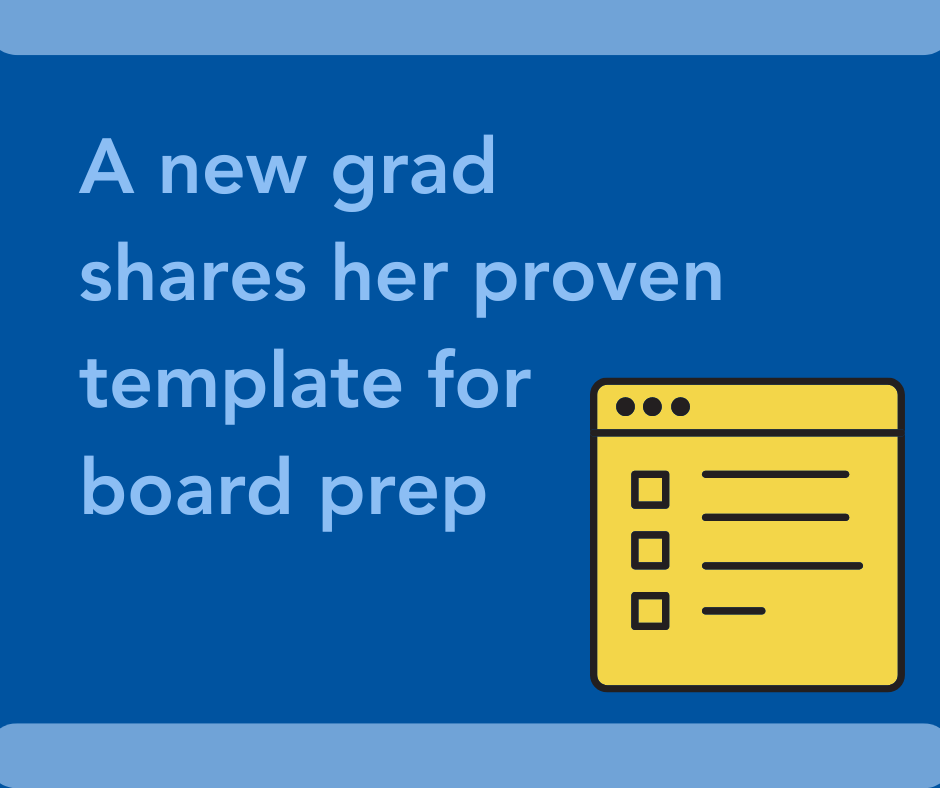Preparing for NP boards: A template for success from a student who passed on the first attempt
- May 8, 2024
Share:

By Anitra Ingram, MSN, APRN, FNP-C
"Plan your work and work your plan." — Napoleon Hill
Prepping for a nurse practitioner certification exam can be overwhelming. I feel your pain. We’re talking high stakes here — a pivotal moment on a path that requires a ton of grit and sacrifice.
If you’re approaching boards right now, you may be grappling with imposter syndrome and self-doubt. Can I tell you something? If you’ve made it this far on your journey, you’ve already got what it takes. You’re in the right community, and you have the right resources. Now it’s time to wrangle those thoughts and emotions with a strategy for success!
I was introduced to APEA by my clinical preceptor, Lindsey Campion, FNP-C, and I now recommend APEA resources to other nurse practitioner candidates. The data I obtained from the APEA Predictor Exam helped me create a strategy to pass the AANP exam for family nurse practitioners on the first attempt.
Each of you will find your own groove and develop the method that works best for your learning style and time capacity, but the underlying principles of the template I describe here are applicable to all.
1. Practice self-care
I know. I'm preaching to the choir, right? This is a foundational step, not just for board prep but for career (and life) longevity. We know the necessity and benefits of self-care. But for most of us, there aren’t enough hours in the day for all.the.things.
Maybe you’ve got it together in this area. Great, keep it up! Maybe you’re juggling a lot of balls, and this is the one that got dropped during grad school. With my clinicals schedule changing every 10 weeks and my commuting to sites, I dropped this ball a few times myself. Task stacking helped me to finally stay consistent with my self-care routine.
I would work up a sweat dancing around the kitchen to my favorite music while preparing a plant-rich meal, do weighted stair stepping while studying instead of sitting, or listen to Navy SEAL mindset training audio lessons and practice box breathing during a 30-minute sauna.
Give yourself grace, but do recommit to the daily exercise, nutrition, and sleep disciplines that will help you feel and perform your absolute best.
2. Start Prepping Early
The board exam is not based on rote memorization; it requires critical thinking and application of knowledge. Please do not attempt to cram for boards. Your brain is not likely to perform as well under the anxiety that panic studying produces.
You need time to build a muscle strong enough to support you through the exam. You need time for repetition, remediation, and deep dive studying to understand the “why.” We may not achieve a deep level of understanding when we first receive new or advanced information. Each time you revisit a subject, you learn a little more.
An illustration: I scored high on the cardiovascular system practice tests in MyQBank and was comfortable with EKG interpretation, but my “why” wasn’t completely satisfied. So I invested time in a more thorough study of electrophysiology, which boosted my knowledge base to apply and correctly answer a board exam question on this topic.
Leverage your time well by prepping for boards at least 3 to 4 months before your desired exam date. Retrospectively, I feel I would have been able to reduce my stress level about board prep even more if I had been armed with a focused study plan 6 to 8 months before my exam date.
Whatever timeline you decide is right for you, remember that time can be your best tool to avoid unnecessary stress.
3. Take a Review Course
I began my board prep process by attending an APEA Live Review Course & Clinical Update. I chose the webinar option because I was still in clinicals and could not attend in person. You will benefit from an APEA review course regardless of the format (in person, live webinar, or on demand); it just depends on your preference and availability.
I found the faculty to be very knowledgeable, and their teaching style was fun and engaging. The live review course synthesized what I learned in my didactic classes and helped solidify my knowledge base.
While attending the live review webinar course, I learned about the NP Power Hours presented by APEA faculty. These free webinars provide case studies and exam question practice in community with other nurse practitioner students. I attended several Power Hours before my exam and gained knowledge and confidence. In fact, I plan to continue attending Power Hours even though I have passed my exam. (To learn about future Power Hours, follow APEA on Facebook or Instagram, or sign up for email notifications.)
4. Take a Predictor Exam
I took two APEA Predictor Exams, one at the start of my board prep process and the other 3 to 4 weeks before my exam date. These exams were invaluable. The detailed results reports provided a baseline and confirmed that my study process was effective. I used the data to prioritize my weaker subject areas, subtopics, and testing domains.
My initial Predictor Exam score of 69% was borderline, but I didn’t get flustered because I knew I had time to improve. My second Predictor Exam score of 78% was better — and it indicated I had a high likelihood of passing my exam. (APEA Predictor Exams are the only exams proven to predict a student’s likelihood of passing a national certification exam.)
I continued to study until my scores on full-length practice exams in MyQBank were consistently between 80% and 90%. I also encourage candidates to take the practice exam your certifying body offers to simulate the exam experience.
5. Create a study plan and schedule
A careful review of the blueprint for your certification exam is essential. The course materials for the APEA Live Review Course contain information about the exam blueprints, and this blog article details the new 2024 FNP blueprint from the American Association of Nurse Practitioners Certification Board.
Once you have reviewed your board certification blueprint and identified your weakest knowledge areas, you can create a study plan.
Set a realistic schedule and pace yourself. Start your study plan with your weakest areas first, and schedule a full week to study each area. Pair this with daily MyQBank sessions for the corresponding area of focus.
You may choose not to spend a whole week on the stronger areas where you’re consistently scoring 75% or better, but don’t ignore them altogether. Allot time in your study schedule for these areas to lessen the forgetting curve.
Don’t study to the point of exhaustion. Mental and physical fatigue will not serve you well leading up to and on exam day. It’s necessary to take a break from studying to enjoy time with positive, supportive family and friends … I’m talking easy like Sunday mornin’ vibes. Make space for rest and play in your study schedule as well.
6. Increase your content knowledge
If you identify weakness in a specific topic (e.g., neurology, professional issues) or domain (e.g., assessment, diagnosis, pharmacotherapeutics), my advice is this: Face your areas of weakness head-on to master the content.
I call this “wrangling the bull.” How do you know when you’ve achieved mastery? When you know the content well enough to explain or teach someone else, you understand “why,” and you can confidently answer MyQBank questions on the subject within 1 minute.
Try applying the teaching strategy in your weaker areas. It’s perfect if group study is your thing. If studying solo, grab your smartphone camera and start teaching!
7. Apply your knowledge: Use MyQBank
Making sure your content knowledge is solid is only half the battle. The other half is applying your knowledge to board exam questions. This involves learning to analyze and dissect the question to understand what is really being asked.
The best way to practice this is by using MyQBank. Practice answering the questions in 1 minute or less, study the rationales for each question, and flag the questions you missed so you can go back to your text and remediate in these areas.
In addition, practice taking full-length, timed exams in MyQBank to build the mental stamina and pace required for a 3-hour exam.
8. Reassess areas of weakness and strength
Rinse and repeat steps 6 and 7 until your scores are consistently above 75%. If your scores are not quite there, don’t get discouraged. With consistency, your understanding and mastery will progressively improve and your confidence will increase.
9. Schedule your exam
Earlier I remarked that time is one of your best tools. Well, there’s a caveat. If you wait too long to test without taking into account the forgetting curve and staying in the momentum of your study plan, time may begin to work against you.
Don’t be afraid to set the date and stick to it. If you’ve planned your work and worked your plan to completion, and the data you’re receiving from your practice and Predictor Exams exceed the recommended benchmark, go for it!
If life happens and you need to postpone your board exam, don’t relinquish the momentum you’ve already built. Keep working your plan until you can take your exam.
Tip: I personally found that not disclosing my exam date until after testing alleviated external pressure.
10. Trust your process
Throughout your preparation for exam day, you will need to monitor your thoughts in order to manage your emotions. It's normal to feel nervous, and you can expect negative thoughts to arise involuntarily. You must be ready to choose your response and replace the negative thought.
For example, replace "this exam is too hard, I'm not sure I'm going to pass" with "this may be a challenging process, but I can do this. I will pass."
Breathe, refocus, and trust that you are prepared.
Anitra Ingram, MSN, APRN, FNP-C, is a family nurse practitioner, HRSA Nurse Corps Scholar, and a member of the American Association of Nurse Practitioners and Sigma Theta Tau International Honor Society of Nursing. Anitra is enthusiastic about encouraging nurse practitioner students along their journey, and she champions new nurse practitioners being embraced in supportive communities. Learn more about Anitra at www.anitraingram.com
Share:

Anitra Ingram
Anitra Ingram, MSN, APRN, FNP-C